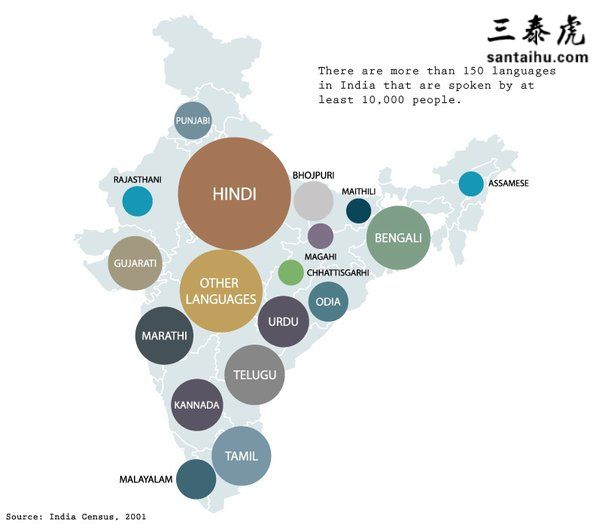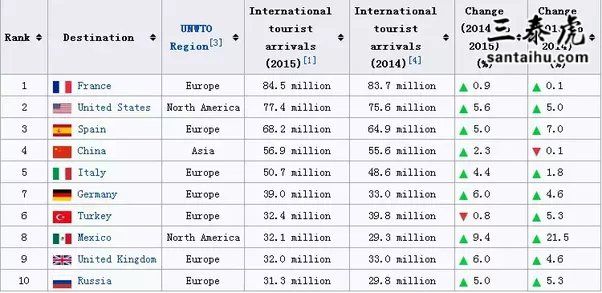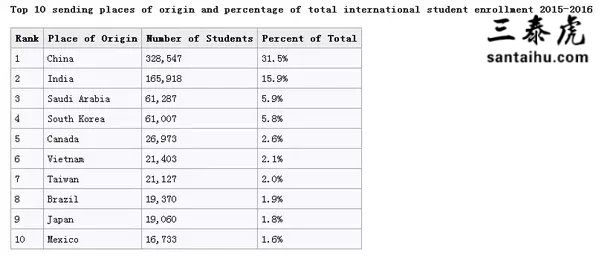If India has higher soft power than China, then why are foreigners more interested in learning Chinese rather than the Indian language?
如果印度的软实力真的比中国高,那为什么比起印地语,外国人更愿意学习中文呢?
以下是Quora网友的评论:
John Garrison
As a foreigner who learned Chinese I can tell you the exact reason.
I was very interested in learning Hindi, in fact I purchased a book and asked a buddy to tutor me in it. But then I realized something kind of depressing.
作为一个学过中文的外国人,我可以告诉你确切的原因。
我曾经对学习印地语很感兴趣,我还买了书,请朋友辅导我。但后来我发现一些事打击了我的积极性。
According to this English proficiency index, India has among the best English speakers in Asia. This is pretty true as I know plenty of foreigners who have travelled to India(both on business and vacation) and gotten by just fine only knowing English.
根据英语熟练指数,印度是亚洲国家中英语水平最高的国家之一。这确是事实,我知道很多外国人会去印度旅行(出差和度假都有),用英语就能畅行印度。
What’s more each region in India has a different language, I didn’t have time to learn 10 languages. In absolute terms I could reach more people with Mandarin Chinese than with any single Indian language. In fact I would need to learn Hindi, Bengali, Telugu, and Punjabi to reach the same number of people as Mandarin Chinese. Let’s see…learn 4 languages, or learn 1….hmmm….
更重要的是,印度每个地区都有各自不同的语言,我没有那么多时间来学习10种语言。从人数上而言,比起用任意一种印度语言,我用普通话可以接触到的人要多得多。事实上,我大概需要学会印度语、孟加拉语、泰卢固语和旁遮普语4种语言,接触到的人才能和普通话一样多。大家设想看看,是要学习4种语言,还是学习1种呢....嗯....
It seems the Indians also asked themselves this question because English and Hindi are both given status in the government, and English(according to the BBC article below) is the sole lingua franca of India. I already know English, so I’m not going to learn a whole new language just to speak English all the time.
印度人自己似乎也在思考这个问题,因为英语和印度语在政府中都有一席之地,根据BBC的报道,英语是印度唯一的通用语。我本来就会英语啊,所以我才不愿意学完一门全新的语言后,还要一直说英语。
Business in India is conducted in English most of the time, so what good would Hindi do for me? In a work group I might have a Tamil speaker, a Marathi speaker, a Hindi speaker, and a Punjabi speaker. Rather than having everyone learn 4 languages, we would all communicate in English. Therefore I don’t need to learn an Indian language.
大多数情况下,大家都可以用英语在印度做生意,那么印度语对我有什么好处呢?在一个工作小组中,可能有人说泰米尔语,有人说马拉地语,有人说印地语,有人说旁遮普语。与其让每个人都学4种语言,不如大家都用英语交流。所以我没有必要学习印度语言。
In China it doesn’t work that way. Business is conducted largely in Chinese, in fact the only time English is involved is when you are dealing with a foreign company. If you have a room full of Chinese people, they will speak Chinese. In India though you could see a room full of Indian people speaking English to each other.
但在中国就不一样了,大家基本都用中文来进行商务活动,事实上,只有在和外国公司打交道的时候才会用到英语。如果很多中国人聚集在一起,他们只会说中文。但在印度,一屋子的印度人会互相说英语。
I want to learn an Indian language, but they aren’t exactly easy languages, and I find it hard to motivate myself to do it when it isn’t necessary.
我想学一门印度语言,但一点都不简单,而且我发现不是很有必要的情况下,我很难激励自己学下去。
Roy Fox
One word: usefulness.
The majority of foreign citizens aren’t going to speak to rural Indians living in India’s interior. They’ll more likely speak to India’s urban population…
…with whom English is certainly more useful than any Indian language.
一个词:有用。
大多数外国公民都不会跟居住在印度内陆的村民交谈。他们跟印度的城市人口交流的机会更多……
所以英语肯定比所有印度语言都好用
Chinese is, however, very useful if you want to go to China, because not as many people speak English at all.
但如果你想去中国,中文是非常有用的,因为说英语的人不太多。
Put simply, too many people speak English in India too well for Hindi or Bengali or Kannada to be useful to a foreign individual. So the foreign individual chooses not to learn Hindi or Bengali or Kannada, because it isn’t worth it- English will do. Heck, for certain Indians raised in English (moi, for instance), English is the preferred language. Why go to any lengths to learn a very difficult language you will likely not use in India if you’re a foreign citizen?
简而言之,印度有太多人能说一口流利的英语,所以印地语、孟加拉语或坎那达语对外国人来说派不上用场。
所以外国人没有必要学习印度语、孟加拉语或坎那达语,不值当——说英语就可以了。
对于某些在英语环境中长大的印度人来说,英语是第一语言。
作为外国人,为什么要费心费力去学习一门在印度可能用不上的非常难学的语言呢?
Stressed by a Mountain of Books
Isn’t it obvious that in current circumstances they will be more inclined to learn Chinese? Well to name few prominent ones:
1.China is the largest economy(in terms of ppp) with a pretty high growth rate
2.Ease of doing business is better in China
3.More professionalism
4.Only single language required
5.To work in India you don’t need any Indian language, English will do
就目前而言,他们更愿意学习汉语,这不是很明显的事吗?下面列举几个突出的例子:
1. 中国是全球最大的经济体(按购买力平价计算),经济增长率很高
2. 在中国经商更容易
3. 更具有专业精神
4. 一门语言通行全国
5. 在印度工作,你都用不上印度语言,用英语就可以了
JC Hóu
India has higher soft power than China,
Not necessarily. It really depends on your target audience.
For East Asians, the influence of India’s soft power is not comparable to China’s. The reverse is true for South Asians. For non-Asian people, what you probably would get is similar amounts of people who want to learn Chinese, and those who want to learn the Indian languages, which brings us to my next argument:
印度的软实力比中国强?
这可不一定。这取决于目标受众群体是谁。
对于东亚人来说,印度软实力的影响力根本无法与中国相提并论。对于其他大洲的人而言,想学中文和想学印度语言的人也许总数相当,这就引出了我的下一个论点:
There are too many “Indian languages”, and none of them are exactly dominant even within India’s borders (Hindi is bordering being dominant in some degree with over 400 million native speakers, but still only spoken by less than 60% of the entire Indian population) which make none of them comparatively influential as Mandarin Chinese, or even Cantonese (120 million native speakers).
印度有太多种“语言”了,印度境内都没有哪种语言是完全占据主导地位的,在一定程度上,印地语最接近主导地位,超过4亿人说印地语,但所占比例不到60%,所以影响力远远比不上中国的普通话,甚至广东话(1.2亿人以广东话为母语)。

Finally, there is the language with even more “soft power”: English. And unfortunately for advocates for the use of Indian languages, there are simply “too many” Indians that can and are willing to speak English, although this can be a major advantage in various other fields (such as IT outsourcing).
最后,还有一种语言“软实力”更强:英语。但对那些呼吁使用印度语言的人来说,有”太多”印度人能够并愿意说英语,虽然在多个领域,如IT外包,英语反倒成了主要优势。
Think about it:
If you are given the choice to learn 1 or 2 languages to cover 98% of a population of 1.4 billion people, or to learn at least 6 or more languages to cover ~85% of a similarly big population, what would be your decision?
What if you also happen to speak another language (possibly your mother tongue - English), that is also spoken by at least 12% (highly likely to be middle class or higher class people) of the latter?
想想看:
如果让你选择,学习1 - 2种语言就能和14亿人口中的98%沟通,或者至少学习6种或更多的语言,来和14亿人口中的85%沟通,你会如何做决定?
如果你刚好会说另一种语言(比如你的母语——英语),而第二种情况中至少有12%(很可能是中产阶级或更高阶级的人)也会说英语,你会如何做决定?
Aisha K
I'm a proud Indian and I feel I must answer this question.
First of all, it isn't 'the Indian language’. There is no such language called 'Indian' so I think foreigners have to correct themselves there because it really ticks off Indians.
我是一个自豪的印度人,我觉得我必须回答这个问题。
首先,所谓“印度语言”并不存在,印度没有所谓的“印度语”,所以我认为外国人必须纠正自己的观念,因为这么说会得罪印度人。
Next, India has nearly 22 official languages. Each state has a different official language so it obviously doesn't make sense that a foreigner learn all these 22 languages to survive in India.
其次,印度有近22种官方语言。每个邦都有不同的官方语言,所以一个外国人为了在印度生活,学习这22种语言显然没有意义。
India has a total of 121 languages, spoken in 19,500 dialects according to census.
India is a country of huge diversity. Most widely spoken languages in India are English and Hindi. If you know these two languages, you definitely can survive in India.
根据人口普查,印度共有121种语言,有1.95万种方言。
印度是一个多元化的国家。印度使用程度最广的语言是英语和印地语。如果你掌握这两种语言,就绝对能在印度生存。
Besides, Indians speak the best English in Asia and that's probably why foreigners don't find the need to learn Indian languages.
I hope this answer helps.
此外,印度人的英语水平在亚洲地区首屈一指,这可能也导致外国人没有必要学习印度语言。
我希望我的答案能对你们有所帮助。
Sanuradha
Well, it is obvious that India is not too keen about promoting its own language in the world, whereas the Chinese don't seem to be afflicted with such apathy. Consider, also, that Chinese is far more difficult than Hindi or any Indian language. Indian languages do not have a particular cultural or economic salience in modern India that would draw business-oriented foreign language learners to them.
Most Indians themselves would actively discourage you from learning Hindi, particularly those who are in business and tech.
好吧,很显然,印度不太热衷于在国际社会推广自己的语言。而且,中文比印度语或任何印度语言都要难学得多。在现代印度,印度语言没有特别的文化或经济优势,无法吸引以商业交流为用途的外语学习者。
大多数印度人自己也会积极打消你学习印地语的热情,特别是那些商业和科技领域的人。
Tian ia
There's no evidence to support the conclusion: “India has higher soft power”, this is people's delusion.
I don’t know how did you define “SOFT Power”, but I think the economic activities is the biggest movitation to learn a language. Economic statistics will give you some ideas, because money talks.This is the world GDP ranking, china is 5 times more than India with almost same size of population.
“印度的软实力更强”这一结论并没有充分的证据,只是人们的错觉。
我不知道你是如何定义“软实力”的,但我认为经济活动是语言学习的最大动力。经济统计数据会给你一些启示,因为有钱能使鬼推磨。世界GDP排名,中国GDP是印度的5倍,而两国人口规模几乎相当。
Beside the GDP, china is also the largest importing and exporting country in the world, which tell the truth is: if you wanna make better bussiness, just learn chinese language, in comparison to india, india did a little in exporting and imporing part.Which tells you the reality, at least in the bussiness sector, chinese language values more.
除了GDP,中国还是全球最大的进出口国家,这说明了一个事实:如果你想更好地开展生意,就好好学习中文,因为印度的进出口比中国弱很多。这告诉你一个事实,至少在商业领域,中文更有价值。
接下来, let’s see the tourism part.
然后,让我们看看旅游业的情况。

According to wikipedia, china’s tourist arrival ranks 4th in the world, with 58 millions arrival, meanwhile India is not even in the world top 10, only 8 million tourists arrivals.
根据维基百科的数据,中国接待外国游客的人数为5800万,排名全球第四,而印度甚至没能进入前10,只有800万游客。
let’s see the numbers of international student.
让我们看看国际学生的数量。

None of above statistics proves “india has more soft power compare to china”. China and india are not even close in “soft powers”. Language is a tool of communication to help the understanding of each other, without motivative activities such as trading,studying and tourism, there’s no need to learn another language.
以上数据都无法证明“印度的软实力超过中国”。在“软实力”方面,中国和印度存在较大差距。语言是帮助彼此理解的交流工具,如果没有贸易、学习、旅游等活动,就没有必要学习另一种语言了。
Don’t even mention that there are more than 5 or 6 major languages in india, but china only use madarin as official language.
So, the truth is, becuase china has much stronger soft power, then much more people choose to learn chinese instead of indian language.
更别提印度有不止5、6种主要语言了,而中国的官方语言就只有普通话。
所以,事实就是,中国拥有更强大的软实力,所以更多的人选择学习中文。
 外国人在广州体验无人驾驶的公交车
外国人在广州体验无人驾驶的公交车 为什么印度南方人不把印地语当作自
为什么印度南方人不把印地语当作自 印度43.5%的人口说印地语,为什么不
印度43.5%的人口说印地语,为什么不 外国人:在中国生活的十大理由是什么
外国人:在中国生活的十大理由是什么 (VIP)印媒:重新命名,中国公布藏南地
(VIP)印媒:重新命名,中国公布藏南地 Quora:中国的医院怎么样,公立医院更
Quora:中国的医院怎么样,公立医院更 在中国取得医学博士学位、汉语流利
在中国取得医学博士学位、汉语流利 外国人乘坐京沪高铁,感觉像是在乘坐
外国人乘坐京沪高铁,感觉像是在乘坐